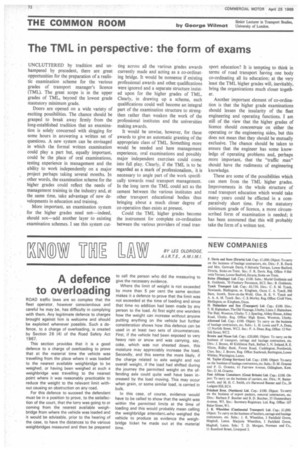The TML in perspective: the form of exams
Page 74

If you've noticed an error in this article please click here to report it so we can fix it.
UNCLUTTERED by tradition and unhampered by precedent, there are great opportunities for the preparation of a realistic examination scheme for the various grades of transport manager's licence (TML). The great scope is in the upper grades of TML, beyond the lowest grade staututory minimum grade.
Doors are opened on a wide variety of exciting possibilities. The chance should be grasped to break away firmly from the long-established tradition that an examination is solely concerned with slogging for some hours in answering a written set of questions. A new system can be envisaged in which the formal written examination could play a part but, equally important, could be the place of oral examinations, testing experience in management and the ability to work independently on a major project perhaps taking several months. In other words, the examination scheme for the higher grades could reflect the needs of management training in the industry and, at the same time, take advantage of new developments in education and training.
More important, an examination system for the higher grades need not—indeed, should not—add another layer to existing examination schemes. I see this system cut ting across all the various grades awards currently made and acting as a co-ordinating bridge. It would be nonsense if existing professional awards and other qualifications were ignored and a separate structure insisted upon for the higher grades of TML. Clearly, in drawing up a scheme, such qualifications could well become an integral part of the examination structure to strengthen rather than weaken the work of the professional institutes and the universities making awards.
It would be unwise, however, for these awards to give an automatic granting of the appropriate class of TML. Something more would be needed and here management experience, oral examinations and possibly major independent exercises could come into full play. Clearly, if the TML is to be regarded as a mark of professionalism, it is necessary to angle part of the work specifically towards road transport management. In the long term the TML could act as the cement between the various institutes and other transport educational bodies thus bringing about a much closer degree of co-operation than exists at present.
Could the TML higher grades become the instrument for complete co-ordination between the various providers of road tran sport education? It is tempting to think in terms of road transport having one body co-ordinating all its education; at the very least the TML higher grades will, inevitably, bring the organizations much closer together.
Another important element of co-ordination is that the higher grade examinations should lessen the insularity of the fleet engineering and operating functions. I am still of the view that the higher grades of licence should concentrate on either the operating or the engineering sides, but this does not mean that they should be mutually exclusive. The chance should be taken to ensure that the engineer has some knowledge of operating problems and, perhaps more important, that the "traffic man" should have the rudiments of engineering knowledge.
These are some of the possibilities which can stem from the TML higher grades. Improvements in the whole structure of road transport education which would take many years could be effected in a comparatively short time. For the statutory minimum grade of licence, a more circumscribed form of examination is needed; it has been announed that this will probably take the form of a written test.
























































































































